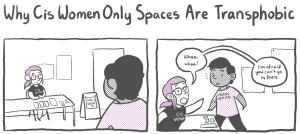
Two people on a bed together, smiling at each other and holding hands.
Put two feminists in a room together and you’ll have three definitions of the term “sex positive.” For all that we love to use this label, it’s hard to agree on exactly what it means.
To me, sex positivity has always been about two things: 1) affirming that sex can be a healthy part of human life that shouldn’t be shamed or stigmatized, and 2) affirming the choices others make regarding sex, even if those choices are different from the ones we would make (as long as those choices are consensual).
And by the way, the “healthy part of human life” part doesn’t mean it has to be part of every human’s life – more on that later.
But all of that probably sounds pretty vague. Sometimes it’s easier to define a term by what it isn’t than what it is.
My aim here isn’t to negate the fact that some people use the term “sex positivity” differently than I do. Disagreements about meanings are inevitable when it comes to feminism and social justice.
Rather, I aim to envision a sex positivity that is inclusive and intersectional, one that welcomes folks with a variety of identities, experiences, and perspectives. Sex positivity isn’t just for straight, cis, able-bodied white women. It can – and should – be for everyone, even people who aren’t interested in sex themselves.
Here are some common things that people think are sex-positive, but really aren’t, necessarily:
1. Liking Sex
If sex positivity were as simple as enjoying sex, there’d be a lot more sex-positive people. Alas, it’s not that easy.
Plenty of people who love sex nevertheless judge and shame other people for the way they have sex.
Plenty of people who love sex are queerphobic and transphobic, and that’s not compatible with any sex positivity I want anything to do with. Plenty of people who love sex coerce others into having sex with them, which proves that they don’t really believe that others should get to do what they want with their own bodies and sex lives.
As sex educator Charlie Glickman writes, “The fact that someone enjoys sex doesn’t necessarily mean that they can honor and celebrate sexual choices and practices that they don’t do.”
On the flip side, the fact that liking sex isn’t synonymous with sex positivity also means that you can be sex-positive without liking sex at all – as long as you support people who do. Disliking or being uninterested in sex is part of the spectrum of human sexuality, so any sex positivity worth its salt affirms that.
2. Thinking Everyone Should Like Sex
If sex positivity isn’t the same as liking sex, it’s especially not the same as thinking everyone should like sex.
People have all sorts of reasons for being disinterested in, scared of, or repulsed by sex, and all of those reasons are valid – even if they don’t make sense to you.
Unfortunately, some people think that sex positivity is about introducing everyone to the joys of sex, whether they’re interested or not. To these folks, you can’t be sex positive if you’re not (happily) sexually active, and if you don’t want to be, you must have “internalized sex negativity.”
While internalized sex negativity is absolutely a thing – for instance, when we feel shame over how little or how much we have sex – everyone doesn’t have to like sex in order for us to create a truly sex positive culture.
3. Not Having Any Boundaries
Some people worry that they can’t be truly sex-positive if they have sexual boundaries, such as being uncomfortable with being called certain words by a partner or with having sex in certain positions.
If I’m really sex-positive, they wonder, shouldn’t I explore different ways of having sex and expand my comfort zone?
Sure – if that’s something you want. You don’t have to do it for anyone else, or for the sake of claiming a label.
And even the most sexually adventurous people have boundaries of some sort, and most people who think they have no sexual boundaries at all are simply unaware of where those boundaries lie.
That’s why the scariest thing I can hear from a partner when I ask them what they’re interested in is “Anything you want!” (Really? Anything?)
Knowing your boundaries and doing your best to articulate them clearly to your partner(s) is among the most sex-positive things you can do. It’s not always easy, but it’s always worth doing.
4. Being Up For Sex All the Time, With Anyone
Similarly, some people think that being sex-positive means having sex with anyone who’s interested, as much as they want.
For some people in progressive communities – especially women – this has created a new set of sexual expectations. Rather than “just” being expected to be sexually available for a (monogamous) boyfriend or husband, now they’re supposed to have sex with everyone, all the time, because sex positivity!
It’s not just an expectation placed by some people upon themselves, though. Abusive people sometimes co-opt the language of sex positivity to get others to have sex with them: “Come on, I thought you were supposed to be sex-positive!”
But that’s just old-fashioned sexual coercion cloaked in faux-progressive language.
If someone is calling you a prude or sex-negative for not having sex with them, they’re violating your consent and their opinion of you is invalid.
And just because you want to create a world in which everyone is empowered to make the sexual choices they want doesn’t mean that you personally have to be interested in casual sex. You get to be as picky (or not) as you want.
5. Sexually Objectifying Others
Another way that some people co-opt the concept of sex positivity is by using it as an excuse to objectify other people.
I’ve called out guys making graphic and unsolicited comments about women’s bodies only to hear that they’re “just expressing my sexuality” and how could I be so sex-negative?
If that’s sex positivity, it sounds exactly like the status quo for centuries.
Real sex positivity is not treating other people like props for your enjoyment. If the only way you can view others (or others of your preferred gender[s]) is through the lens of sexual attraction, that’s something you need to work on.
You can’t truly affirm others and their sexual choices if all you can do is project your own desires onto them.
6. Feeling Entitled to Sex
Some people don’t just sexualize others – they believe that others owe them sex.
That’s sexual entitlement, and sometimes folks claim that their entitlement is actually sex positivity. Don’t fall for it.
Because supporting others in their own sexual choices is such a key part of sex positivity, entitlement has no place in it.
Sure, it’d be great if everyone you wanted to have sex with also wanted to have sex with you, but nobody lives in that world and sex positivity won’t bring that world about. That’s because other people get to have agency, too.
Sexual entitlement lies at the root of sexual violence, so dismantling rape culture means destroying forever the idea that anyone ever owes anyone else sex. It means learning to view other people as individuals with their own needs, desires, and priorities.
As Greta Christina writes, “Sex-positivity does not mean treating the entire world as a sexual buffet.”
7. Making Other People Listen to Your Sex Stories
Some people who identify as sex-positive – especially those who have recently come to that identity – are very passionate about reducing the collective discomfort our society encourages around sexual topics.
“Why shouldn’t talking about sex be just like talking about the weather or what movie you saw over the weekend?” they ask.
It’d be cool if we could someday get to that point, but we’re not nearly there yet. That means that most people don’t necessarily want to hear everyone’s graphic sex stories all of the time, and that’s a boundary they get to set.
If you want to share some sexual details with someone, ask for consent first. And if someone asks you to stop discussing sex with them, apologize and stop.
Don’t accuse them of being insufficiently sex-positive. It’s important to reduce the stigma of talking about sex, but trampling over other people’s boundaries is not the way to do it.
8. Ignoring Power Dynamics and Intersectionality
Critiquing the ways in which we talk about and have sex is part of any anti-oppressive framework. But some people think that critiquing consensual sex practices is wrong because it’s the same thing as shaming people for them – as being sex-negative.
Here’s the thing, though – we don’t have sex in a vacuum any more than we buy products, work jobs, or consume media in a vacuum. While it’s important not to get hung up on what some particular individual does or doesn’t do, overall, thinking critically about how we “do” sex is vital.
Because of power dynamics, sex can be consensual on the face of it, but still deeply damaging for one or more of the people involved. While it’s not our place to patronizingly tell individuals that they’re hurting themselves, it is our place to look at the bigger picture.
When someone consents to sex with someone they’re not attracted to because their body is deemed so undesirable by our society that they feel they ought to be grateful for the attention, there’s something going on there.
When a professor sleeps with a college student from their class, there’s something going on there. When a middle-aged person consistently seeks out much younger people as partners, there’s something going on there.
That something is mismatched power dynamics, and if we’re going to approach sex positivity through an intersectional lens, that means we have to critically analyze that.
9. Believing That Some Ways of Being Sexual Are Inherently Better Than Others
For many people who are exploring sex positivity, it’s important to push back against some our cultural values about which ways of having sex are acceptable or valid. That means celebrating and affirming people who choose polyamory, kink, BDSM, and other non-vanilla approaches to sexuality and relationships.
And that’s great! But it’s no longer sex positivity when it includes ridiculing people who enjoy vanilla sex and monogamous relationships.
Of course, the power dynamics are obviously different– ridiculing vanilla monogamous people isn’t going to get them fired from their jobs or separated from their children, like kinky and polyamorous people sometimes get. But that doesn’t mean it’s sex-positive.
Sex positivity encourages people to try new ways of having sex and relationships – if that’s something they’re interested in. If they’re not, that’s fine, too. You can have missionary sex with your monogamous other-sex partner for the rest of your life and still be as sex-positive as the kinky polyamorous queer person next door.
10. Having an Uncomplicated Relationship with Sex
Sex positivity can be a misleading term. “Positivity” makes it sound like it’s all about being happy and having a good time when it comes to sex. It makes it sound like things always have to be easy and simple.
They don’t. Sex can be painful, regrettable, traumatizing, and forgettable – and I want a sex positivity that recognizes that.
I want a sex positivity that is here for all the trauma survivors, all the asexual and aromantic folks, all the people who don’t love their bodies, everyone who’s ever felt ambivalent about sex, anyone who feels like sex has done them more harm than good.
I want a sex positivity that fights for these people, too.
In fact, very few of us have an easy and simple relationship with our own sexuality, let alone with the sexual experiences we have had so far. Many of us have been inspired to build a sex-positive culture specifically because of some of those complicated feelings and histories.
If you don’t feel like sex positivity has space for you right now, that’s okay, and I don’t blame you. But I hope that one day we can build one that does.
[do_widget id=’text-101′]
Miri Mogilevsky is a Contributing Writer for Everyday Feminism and a recently graduated with a Masters in Social Work and is starting a career as a counselor in Columbus, Ohio. She loves reading, writing, and learning about psychology, social justice, and sexuality, and is working on her cat photography skills. Miri writes a blog called Brute Reason, rants on Tumblr, and occasionally even tweets @sondosia.
Search our 3000+ articles!
Read our articles about:
Our online racial justice training
Used by hundreds of universities, non-profits, and businesses.
Click to learn more




















